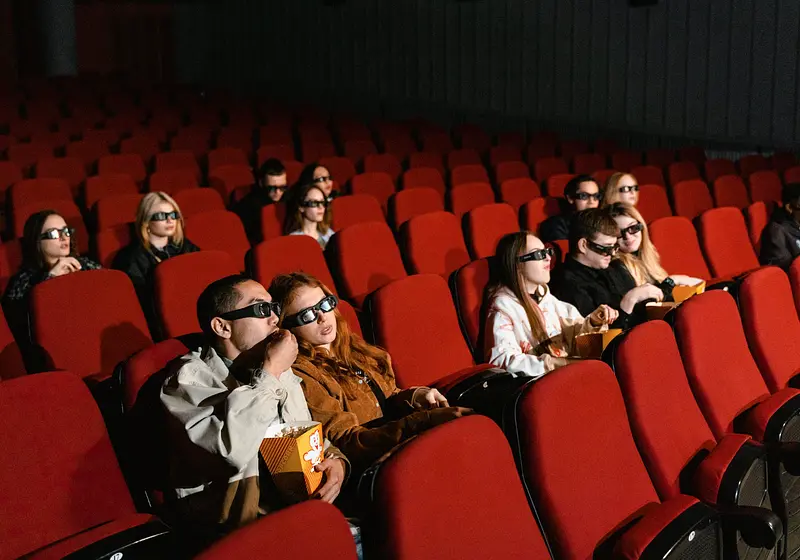Director Baz Luhrmann's new Elvis movie has generated some of the most mixed movie reviews of 2022. What can you expect after buying a ticket to watch this biopic? Does the film show Elvis in a positive light, or does it get into his problematic story? Read more to find out.
Disclaimer: this article is intended to help readers choose if they want to go see Elvis. Though this is a review on different factors of the movie, there are no spoilers involved in this article.
Let us slide into your dms 🥰
Get notified of top trending articles like this one every week! (we won't spam you)Runtime
The first thing to look out for if you're thinking about seeing Elvis is how long it is. Coming in at 2 hours and 39 minutes, this movie is quite lengthy. This runtime can be somewhat justified by the fact that the director did not want to leave anything out of Elvis's 42 years of life.
However, there was very little content focused on Elvis's childhood. Luhrmann does a great job showing Elvis's rise to fame and his struggle to stay famous, though there are a few lulls in the plot. Viewers like myself can't help but wonder if a runtime of over 150 minutes was a necessary sacrifice.

Take the Quiz: Which Generation Matches Your Personality?
Discover the generation you truly belong to!
Cinematography
If you've ever seen a movie directed by Baz Luhrmann, you should know what to expect in terms of camerawork. Elvis is no exception to Luhrmann's quick, colorful, and flashy zooms and transitions. In fact, this type of camerawork is exactly what is needed for a biopic on Elvis: Elvis's quick rise to fame is perfectly encapsulated by the flashing lights and quick-moving scenes of Las Vegas.
Elvis's bright, flamboyant wardrobe also supports this feeling of instant stardom. Needless to say, Elvis is one of the most visually stunning movies of 2022 thus far.
Plot
Without giving away too many details, Elvis has a very interesting plot. The film shows the rise of Elvis, the many ups and downs of his career, and eventually his fall. Someone who played a major part in all of these turns in his career is a man that not as many people are aware of, Colonel Tom Parker.
Parker's status as Elvis's talent manager is quite controversial, and the film dives deeper into the relationship between Elvis and Colonel Parker. This allows viewers to develop their own opinion on him: was the Colonel acting in the interest of himself, Elvis, or both of them? Be prepared for both euphoric triumphs and intense arguments between two of the biggest characters of 2022.
Acting
Going into Elvis, I didn't see much physical similarity between Austin Butler and Elvis Presley. However, what Butler lacks in appearance, he makes up for in performance. Using a southern drawl and matching Elvis's body language, Butler delivers a genuinely convincing performance as Presley.
In an interview with E! News, Butler said that he was "...stripping away the icon, stripping away the caricature, and getting down to his humanity" during production in order to create a deeper connection with the man he was playing. Butler even used method acting, working hard to immerse himself in the world of Elvis.
This caused him to have trouble shaking his newly acquired southern accent after production was finished. Other standout performances came from Alton Mason as Little Richard and Dacre Montgomery as Steve Binder, who propels Elvis's career forward in a time of need.
The Complexity of Elvis
There are a few important, complex plot points that viewers should know about going into Elvis. One of these is the sexual revolution experienced by Elvis's mostly female audience, which is shown early on in the movie.
The concert at which this is shown is a historically important microcosm of what was happening in America at the time: Elvis and other rock-'n'-roll artists finally opened the way for women to express sexual feelings in an open manner. At the same time, however, Elvis found 'inspiration' for his highly energetic music from African American gospel and the blues, another genre founded by Black Americans.
This happened as early as Elvis's childhood, when he grew up in a predominantly Black community and heard gospel and the blues firsthand. Elvis is then shown to twist the Ellie Mae “Big Mama” Thornton song "Hound Dog" and popularize it more than a Black artist like Thornton could have at the time. Later on in the film, a conversation between B.
B. King and Elvis asks viewers to think critically about how Elvis's status as a national heartthrob connects to his whiteness. If Elvis had been Black, or if he had never been 'inspired' by Black music, would he have been so famous?
The Verdict
So, should you go see Elvis? My answer is a resounding yes! Though the film may unnecessarily paint Elvis as a hero at times, it also shows some of his flaws and the way that he suffered from fame in the music industry.
No matter how much you think you know about "The King of Rock and Roll", you'll likely learn a lot about what went on behind the scenes of such a wild time in the history of music and the United States. If you're feeling up to it, prepare for 159 minutes of a new perspective on the unparalleled life of Elvis Presley.














